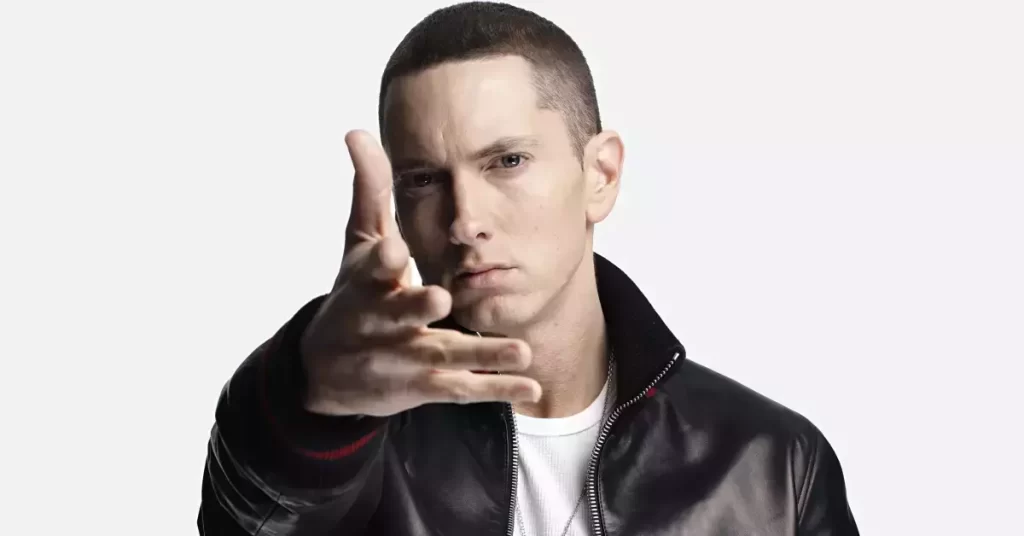Eminem Objects to Ramaswamy’s Use of “Lose Yourself”: A Detailed Look at the Music Licensing Dispute Amidst Ramaswamy’s Rising Popularity
Byline: Dilip Singh Parihar
Date: 28 August, 2023
In a recent clash of worlds between the music industry and politics, rapper Eminem has raised objections to the use of his hit song “Lose Yourself” by Republican presidential candidate Vivek Ramaswamy. The dispute, involving complex legal intricacies and political implications, has garnered significant attention as Ramaswamy’s popularity within the Republican primaries continues to surge.
Background: The Rise of Vivek Ramaswamy
Vivek Ramaswamy, a biotech entrepreneur hailing from Ohio, has swiftly ascended in the realm of American politics. His dynamic and unconventional approach to campaigning, including his choice of “Lose Yourself” as a campaign anthem, resonated with many supporters. The song, a Grammy-winning hit by Eminem from the movie “8 Mile,” became synonymous with Ramaswamy’s energetic public appearances.
Legal Wrangles: Understanding BMI’s Role
The conflict arose when Broadcast Music, Inc. (BMI), a leading music rights management organization, sent a letter to Ramaswamy’s campaign, notifying them that Eminem’s works were no longer part of their licensed repertoire. BMI acts as a liaison between artists and entities seeking to use their music for public performances, ensuring fair compensation and copyright adherence. Eminem’s request to remove his song from the campaign’s playlist triggered this legal development, leading to the song’s exclusion from Ramaswamy’s events.
Political Ramifications: Ramaswamy’s Response and Campaign Impact
Tricia McLaughlin, the spokesperson for Ramaswamy’s campaign, expressed the campaign’s disappointment, emphasizing Ramaswamy’s genuine admiration for Eminem. McLaughlin remarked, “Vivek just got on the stage and cut loose. To the American people’s chagrin, we will have to leave the rapping to the real Slim Shady.” Despite this setback, Ramaswamy’s campaign has continued its vigorous efforts to connect with voters. His response to the situation showcased his resilience in the face of unexpected challenges.
Public Reaction and Social Media Frenzy
The clash swiftly became a topic of intense discussion on social media platforms. Supporters of both Eminem and Ramaswamy engaged in passionate debates, with some defending the rapper’s right to control his artistic work, while others argued for the freedom of expression within political campaigns. Memes, tweets, and online discussions amplified the incident’s visibility, further highlighting the intersection of music, politics, and intellectual property rights.
Polling Data and National Standing
Despite the controversy, Ramaswamy’s popularity has continued to grow. According to recent data from FiveThirtyEight, a prominent polling analysis website, his average approval rating stands at an impressive 10.1%. While this places him among the top contenders in the 2024 Republican presidential primaries, he faces stiff competition from seasoned political figures like former President Donald Trump and Florida Governor Ron DeSantis. The clash with Eminem has done little to deter his ascent in the polls, indicating the resilience of his campaign strategy and policy platform.
Iowa’s Crucial Role
The incident holds particular significance in Iowa, a pivotal state in American politics. In a recent poll conducted by Des Moines Register/NBC News/Mediacom, Ramaswamy’s support was measured at 4%, placing him behind six other candidates. Iowa’s strategic importance as the first state to vote in the primaries has intensified Ramaswamy’s campaign efforts within its borders. His meticulous outreach initiatives, town hall meetings, and engagement with local communities underscore the significance of Iowa in shaping his electoral prospects.
A Glimpse into the Complex Interplay of Music and Politics
The clash between Eminem and Vivek Ramaswamy offers a glimpse into the intricate web of legalities, emotions, and public sentiments that characterize the intersection of music and politics. As the 2024 Republican presidential primaries progress, this incident serves as a testament to the challenges faced by candidates in crafting their public image while respecting the intellectual property rights of artists. How Ramaswamy navigates this complex terrain will undoubtedly influence his campaign’s trajectory, making this dispute a pivotal moment in his political journey.



